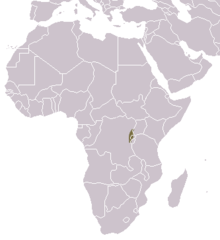Ruwenzori otter shrew
Appearance
(Redirected from Ruwenzori least otter shrew)
| Ruwenzori otter shrew[1] | |
|---|---|
| Scientific classification | |
| Domain: | Eukaryota |
| Kingdom: | Animalia |
| Phylum: | Chordata |
| Class: | Mammalia |
| Order: | Afrosoricida |
| Suborder: | Tenrecomorpha |
| Family: | Potamogalidae |
| Genus: | Micropotamogale |
| Species: | M. ruwenzorii
|
| Binomial name | |
| Micropotamogale ruwenzorii (de Witte & Frechkop, 1955)
| |

| |
| Ruwenzori otter shrew range | |
The Ruwenzori otter shrew (Micropotamogale ruwenzorii) is a species of semiaquatic dwarf otter shrew of the family Potamogalidae.[3] It is found in the Democratic Republic of the Congo, Rwanda, and Uganda. Otter shrews are shrew-like afrotherian mammals found in sub-Saharan Africa. They are most closely related to the tenrecs of Madagascar.[3]
Behavior and habitat
[edit]Ruwenzori otter shrews live in the rivers and streams of various biomes, mostly in forests. They also live at various altitudes, ranging from lowland forests just a few hundred meters above sea level to montane forests over 2,000 m (6,600 ft) above sea level.[2] Its prey is primarily small animals, such as fish, crabs, worms, insects, and small frogs. It is threatened by habitat loss.[2]
References
[edit]- ^ Bronner, G.N.; Jenkins, P.D. (2005). "Order Afrosoricida". In Wilson, D.E.; Reeder, D.M (eds.). Mammal Species of the World: A Taxonomic and Geographic Reference (3rd ed.). Johns Hopkins University Press. p. 76. ISBN 978-0-8018-8221-0. OCLC 62265494.
- ^ a b c Stephenson, P.J. (2016). "Micropotamogale ruwenzorii". IUCN Red List of Threatened Species. 2016: e.T13394A21287768. doi:10.2305/IUCN.UK.2016-1.RLTS.T13394A21287768.en. Retrieved 16 November 2021.
- ^ a b Everson, K. M.; Soarimalala, V.; Goodman, S. M.; Olson, L. E. (2016). "Multiple Loci and Complete Taxonomic Sampling Resolve the Phylogeny and Biogeographic History of Tenrecs (Mammalia: Tenrecidae) and Reveal Higher Speciation Rates in Madagascar's Humid Forests". Systematic Biology. 65 (5): 890–909. doi:10.1093/sysbio/syw034. PMID 27103169.

